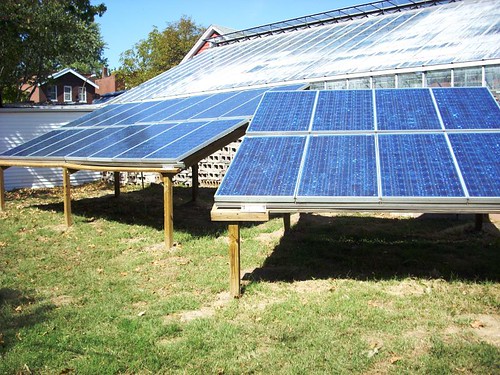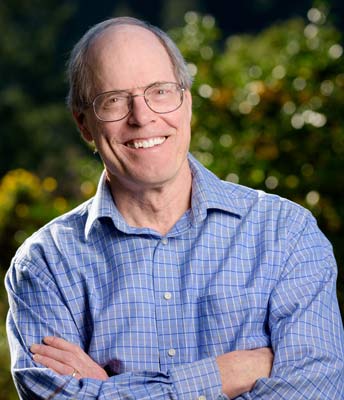
Could solar solve more than just emissions problems? Author Robert Stayton proposes an idea that would raise everyone out of poverty and get us off of fossil fuels. (Ben West/Creative Commons)

Could solar solve more than just emissions problems? Author Robert Stayton proposes an idea that would raise everyone out of poverty and get us off of fossil fuels. (Ben West/Creative Commons)
As our planet faces a climate emergency, the focus on emission reduction is vital. Solar power can help with that. But — here’s the twist — solar also might be the key to economic stability for our entire planet.

It may sound a little wild, but author and professor Robert Stayton lays out all the details in his new book, “Solar Dividends: How Solar Energy Can Generate a Basic Income for Everyone on Earth.”
Stayton, who teaches courses at the University of California, Santa Cruz and Cabrillo College ranging from physics to solar energy, has made solar his life’s work.
And it actually was work on Stayton’s last book that inspired his newest release.
“While writing my previous book ‘Power Shift,’ which is about how we can transition from fossil fuels to renewable energy, I was trying to figure out how much renewable energy we would need,” Stayton said. “That is, if we managed to transition 100% to solar and wind, how much would we need to install to run a modern civilization?
“I wanted to show that it was not such a ridiculous number that it would be impossible to accomplish,” he said.
Finding a solution like the one Stayton discusses in “Solar Dividends” takes a lot of hours calculating and planning, and Stayton also shared just how long he spent with his calculations on coming up with a possible solution to clean energy.
“I had to take into account population growth, improvements in energy efficiency, delivering energy services to all people, and the intermittent nature of solar and wind,” he said. “I calculated that for the solar PV (photovoltaic) component of such a future energy system, we would need to install 100 terawatts of panels, that is, 100 trillion watts. Such a huge number is hard to relate to, so I looked at how much that would be per person, to put it on a human scale.
“By 2070 our population is expected to be 10 billion, so dividing 100 trillion by 10 billion, I got 10,000 watts per person. So I concluded that if we installed 10 kilowatts of PV for each person on the planet, we would have enough energy to run a modern world economy, including all industry, commerce, and transportation.
“That’s when the lightbulb over my head lit up: Why not just give everyone a 10 kilowatt PV system? ‘Nah, that’s crazy,’ I thought,” Stayton said. “But the idea stuck in my head, and I spent the next four years working out exactly how we could do that, connecting it to universal basic incomes, and the result is my new book ‘Solar Dividends,’” Stayton added.
Making a transition to a cleaner form of energy will take time no matter the type of energy that is being discussed. For example, even though every democratic presidential candidate thinks climate change is a real issue that has to be addressed they all have different ways to combat it with either what type of energy should be used or what legislation should be passed.
“I’m the first to describe using the income from solar energy instead of taxes to pay for basic incomes,” Stayton said.
However, “Solar Dividends” is not just about how solar will benefit people from a clean energy standpoint but an economic one as well. Throughout the book, Stayton describes how switching to solar energy will benefit everyone — no matter their social status — instead of a “few oil tycoons” as he describes in the book.
“Unlike oil, no one owns the sun. Many people have described solar as a common resource, but my book describes a specific program for how to give everyone a piece of an economy that is based on solar energy,” Stayton said.
“Instead of a few oligarchs making lots of money on oil, everyone would be making a modest amount on solar,” he said. “By providing a base level of economic security for everyone and by eliminating the need for conflict over oil, we create a more peaceful and just society.”